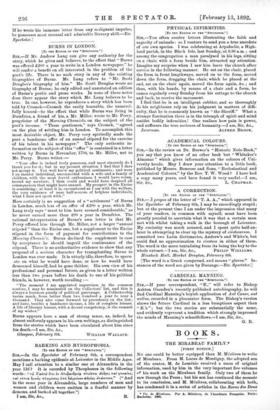BURNS IN LONDON.
[TO TEE EDITOR OF THE "SPECTATOR."]
SIR,—If Mr. Andrew Lang can give any authority for the story, which he gives and believes, to the effect that " Burns was offered £200 a year to write in a London newspaper." he will confer a benefit on all interested in the problem of the poet's life. There is no such story in any of the existing biographies of Burns. Mr. Lang refers to " Mr. Scott Douglas's biography of him." Mr. Scott Douglas wrote no biography of Burns; he only edited and annotated an edition
of Burns's poetic and prose works. In none of these notes does there appear the story which Mr. Lang believes to be true. In one, however, he reproduces a story which has been told by Cromek—Cromek the easily hoaxable, the unmerci-
fully hoaxed—to the effect that while Burns was living in
Dumfries, a friend of his, a Mr. Miller, wrote to Mr. Perry, proprietor of the Morning Chronicle, on the subject of the
poet's income. " These gentlemen," says Cromek, " agreed on the plan of settling him in London. To accomplish this most desirable object, Mr. Perry very spiritedly made the poet a handsome offer of an annual stipend for the exercise of his talent in his newspaper." The only authentic in- formation on the subject of this "offer " is contained in a letter written by Burns in November, 1794, to Mr. Miller, not to Mr. Perry. Burns writes :—
" Your offer is indeed truly generous, and most sincerely do I thank you for it ; but in my present situation I find that I dare not accept it. You well know my political sentiments; and were I an insular individual, unconnected with a wife and a family of children, with the most fervid enthusiasm I would have volun- teered my services; I then could and would have despised all consequences that might have ensued. My prospect in the Excise is something; at least it is, encumbered as I am with the welfare, the very existence of near half-a-score of helpless individuals, what I dare not sport with."
Here certainly is no suggestion of a " settlement " of Burns in London, much less of an offer of £200 a year, which Mr.
Lang truly says " must to him have seemed considerable," as he never earned more than £90 a year in Dumfries. The rational interpretation of Burns's own letter is that Mr. Perry offered him through Mr. Miller, not a larger "annual stipend " than the Excise one, but a supplement to the Excise stipend in the form of payment for contributions to the Morning Chronicle. Barns declined the supplement in case by acceptance he should imperil the continuance of the
stipend. There is no authoritative evidence to show that any proposal of a serious character• for transplanting Burns to London was ever made. It is utterly idle, therefore, to specu- ate on what he would have done, or how he would have demeaned himself, had he gone thither. His own view of his professional and personal future, as given in a letter written less than two years before his death to one of his political friends, is, however, worth recalling :—
" The moment I am appointed supervisor, in the common routine, I may be nominated on the Collectors' list, and this is always a business purely of political patronage. A Collectorship varies much, from better than two hundred a year to near a thousand. 'I hey also come forward by precedency on the list; and have, besides a handsome income, a life of complete leisure. A life of literary leisure, with a decent competency, is the summit of my wishes.'
Burns appears here a man of strong sense, as, indeed, be almost uniformly appears in his own writings, as distinguished from the stories which have been circulated about him since his death.—I am, Sir, &c.,


































 Previous page
Previous page